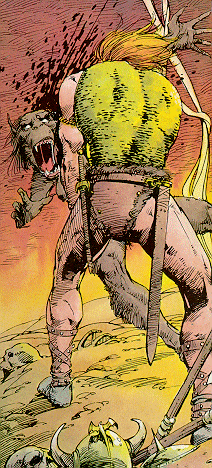
The theme of eternal battle between men and monster can be perceived through the different stories told by scopsat the celebration. The main idea behind the stories is that even though Beowulf has heroically defeated Grendel , or mortally wounded him, the greater evil may not be defeated for it comes from a different source. The foreshadowing is that this evil will not come from monsters but from within the men. In other words, the real evil within people is still undefeated.
The three stories have different agendas in regards to this theme. The first story, about Sigemund, is a happy one, and in it a hero defeats the dragon: "The hot dragon melted." (Norton, 38) The second story is about a treacherous king, Heremod, who betrays his people, "crime took possession of Heremod" (Norton, 38), and becomes a burden to his tribe.
The last story is about Hildeburh, sister of King Hnaef (Norton, 41), who was married to Finn, king of the Jutes. Hnaef paid a friendly visit to his sister's home. Finn and Hnaef had an argument, and a fight broke out. Hnaef and Finn's son were killed practically before Hildeburh's very eyes. In Anglo-Saxon society, killing a relative was considered to be the worst sin of all. (Britannica, online)
Thus, the evil that caused this horrible deed comes not from an fictional (imaginary) monster, but rather from the very real monster within people themselves. And, these stories show that the battle between good and evil is far from over.